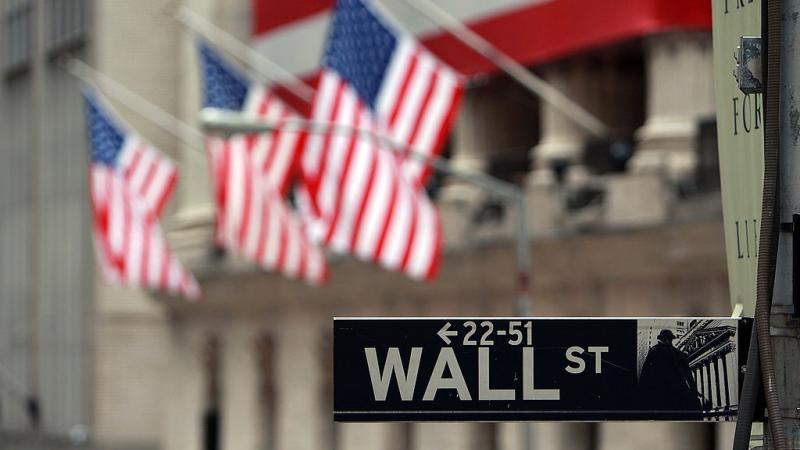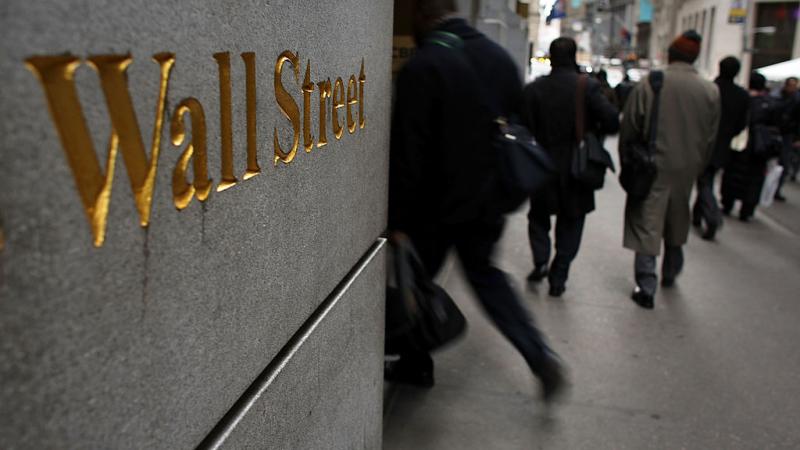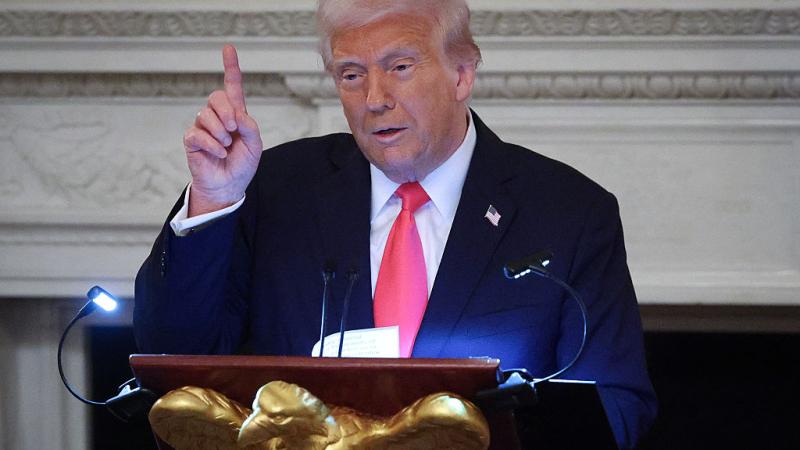Truth Social parent company blames 'false reporting' for drop in Truth Social stock price
The group who owns the Truth Social platform says articles about the company published by Axios and The Financial Times were filled with false assertions that damaged its stock price.
The Trump Media and Technology Group is emphatically accusing two media outlets of falsely reporting that the Trump trust is planning to sell its shares in the company, causing its stock price to tumble.
TMTG on Wednesday submitted a new filing to the Securities and Exchange Commission (SEC), called an S-3 form, which is a simplified statement providing details on the publicly traded company. Those details include sections like a prospectus, risk factors, and balance sheet data. Filing that form precipitated media coverage, specifically, from Axios and The Financial Times.
On Wednesday, Axios reported that TMTG filed papers with the regulatory agency “that would allow Trump’s trust to sell almost 115 million shares of the company's stock” and indicating that the company may want to take advantage of conservative media outlet Newsmax’s public offering on Monday, which saw an increase in that company’s share price.
The same day, Financial Times reported that “Shares in Donald Trump’s social media company fell after the president opened the door to selling his entire $2.3bn stake, just as global investors were bracing themselves for his ‘liberation day’ tariffs.”
Reaction to coverage
TMTG sent letters to the SEC complaining about The Financial Times and Axios. A spokesperson at TMTG said they had sent copies of the letters to the publications themselves. A spokesperson for the SEC declined to comment on the status of the complaining letters. Neither The Financial Times nor Axios immediately responded to requests for comment from Just the News.
TMTG argued that the outlets’ reporting was false and that there were no plans for any of the companies shareholders—including the Trump trust—to sell any portion of their stake. “Legacy media outlets are spreading a fake story suggesting that a TMTG filing today is paving the way for the Trump trust to sell its shares in TMTG,” TMTG said in a statement.
“To be clear, these shares were already registered last June on an S-1 form, and today TMTG submitted a routine filing that re-registers them on an S-3 form in order to keep the Company’s filings effective. In fact, there currently is no open window for any affiliate to sell shares.”
The letters to the SEC
TMTG told the SEC that the Axios and Financial Times reporting represents a “deliberate act of market manipulation designed to harm TMTG and depress its stock price” because of political bias.
In 1934 Congress established the Securities and Exchange Act — commonly called the "34 Act" — which gave the SEC the oversight of publicly-traded companies. Throughout its rulemaking history, the agency promulgated rules prohibiting "market manipulation," most notably Section 10b-5, which prohibits the "employment of manipulative and deceptive devices." The agency has the authority to investigate, and issue subpoenas in pursuit of a civil suit. In extreme cases, they can refer the matter to the Department of Justice for criminal investigation.
TMTG appears to be referring to the publications as the "manipulative devices" targeted by the law: “The omission of this fact allowed Axios to misrepresent the S-3 filing as an indication of a new intention by the Trust to sell its TMTG shares. This false implication was re-reported widely throughout the media, causing an immediate, severe drop in TMTG’s stock price,” the company alleged.
Litigating in social media
Donald Trump Jr., who is in charge of the Trump revocable trust, quickly denounced the stories. “FAKE NEWS!” the younger Trump posted to Truth Social. “As my father has said repeatedly, we have no intention of selling our Truth shares.”
TMTG operates Trump’s Truth Social Platform and recently went public after merging with Digital World Acquisition Corp., which left the president with a stake worth $3.5 billion.
Just days after his election victory, then-President-elect Donald Trump vowed that he would not be selling any of his shares in TMTG after rumors surfaced that he would do so. He publicly batted down the rumors in a Truth Social post.
“There are fake, untrue, and probably illegal rumors and/or statements made by, perhaps, market manipulators or short sellers, that I am interested in selling shares of Truth,” he wrote. “THOSE RUMORS OR STATEMENTS ARE FALSE. I HAVE NO INTENTION OF SELLING!”
Challenges for TMTG in real litigation
“Failure to take these remedial steps will result in litigation and complaints to the relevant authorities concerning Axios’ potentially criminal acts involved in this stock manipulation scheme,” the company wrote. The Financial Times received a similar threat of legal action in the filing addressing its article.
It is far from certain that the SEC would — or even could — take action against the news organizations. The letters demand that both outlets announce and issue retractions of the articles in a “prominent place” on their websites. Nothing in the "34 Act" allows the SEC the authority or even a mechanism to determine whether a statement is in fact "defamatory." Similarly, the SEC does not have the authority to require Axios or The Financial Times to retract a statement and/or issue an apology.
New York securities attorney Stuart Melnick explains in his webpage that there are four elements that TMTG would have to meet. Citing caselaw, Melnick wrote that "a plaintiff must allege that a defendant: (1) made a misstatement or omission of material fact; (2) with scienter; (3) in connection with the purchase or sale of securities; (4) upon which [such] plaintiff relied; and (5) that the plaintiff's reliance was the proximate cause of its injury." "Scienter" is simply the Latin word for "knowingly" or "intentionally."
Media not immune, but hard to tackle
The media does not have immunity from civil claims of course, but under either a theory of securities law, or of ordinary defamation law, TMTG would have an almost insurmountable challenge, because both securities law, and in this case, the First Amendment would require proving that the publications knew of any falsity ahead of time, but nonetheless published the story with "knowing falsity" or "reckless disregard" for the truth.
In 2000, a hoaxster inserted a fake press release about a company called Emulex into the news stream of Internet Wire which was picked up by Bloomberg News. After the publication, Emulex's stock plunged from $110.69 to as low as $43 until company officials declared the release a hoax. The stock rebounded and closed at $105.75. Emulex shareholders sued Bloomberg News in the Southern District of New York, but that case was dismissed, because, wrote the judge, "[a]llegations of a violation of GAAP provisions or SEC regulations, without corresponding fraudulent intent, are not sufficient to state a securities fraud claim."
TMTG would have to show a similar "fraudulent intent" on the part of Axios and The Financial Times.
That's not to say that journalists or publishers haven't been held accountable in the past. In 2003, Porter Stansberry, the publisher of a financial newsletter, was sued by the SEC after he promised investors a sizeable return based on secret information he would sell at a premium. The "tip" turned out to be a fabrication, and a Maryland federal court found him liable for securities fraud. He was required to pay a civil penalty of more than $1 million.
Rarer yet, are instances where a criminal case is brought against a journalist for stock manipulation. In 1985, highly influential Wall Street Journal columnist R. Foster Winans was convicted of violating Section 10(b) of the Securities Exchange Act, although in that case, his crime was not publishing something "deceptive" but instead selling advance knowledge of the next day's market-moving information. He was sentenced to nine months in prison.
Perhaps because of its association with President Trump, Truth Social and TMTG’s stock has been volatile and the company faced short selling campaigns that spurred the company’s CEO, former congressman Devin Nunes, to accuse at least one of the firms involved of "potential market manipulation."
The Facts Inside Our Reporter's Notebook
Links
- S-3 form
- TMTG filed papers with the regulatory agency
- reported that
- The Financial Times
- Axios
- TMTG said in a statement
- manipulative and deceptive
- posted to Truth Social
- which left the president with a stake worth $3.5 billion
- a Truth Social post
- received a similar threat of legal action
- Melnick wrote that
- Scienter
- case was dismissed
- sued by the SEC
- liable for securities fraud
- convicted
- He was sentenced to nine months in prison
- stock has been volatile
- faced short selling campaigns
- to accuse at least one of the firms















